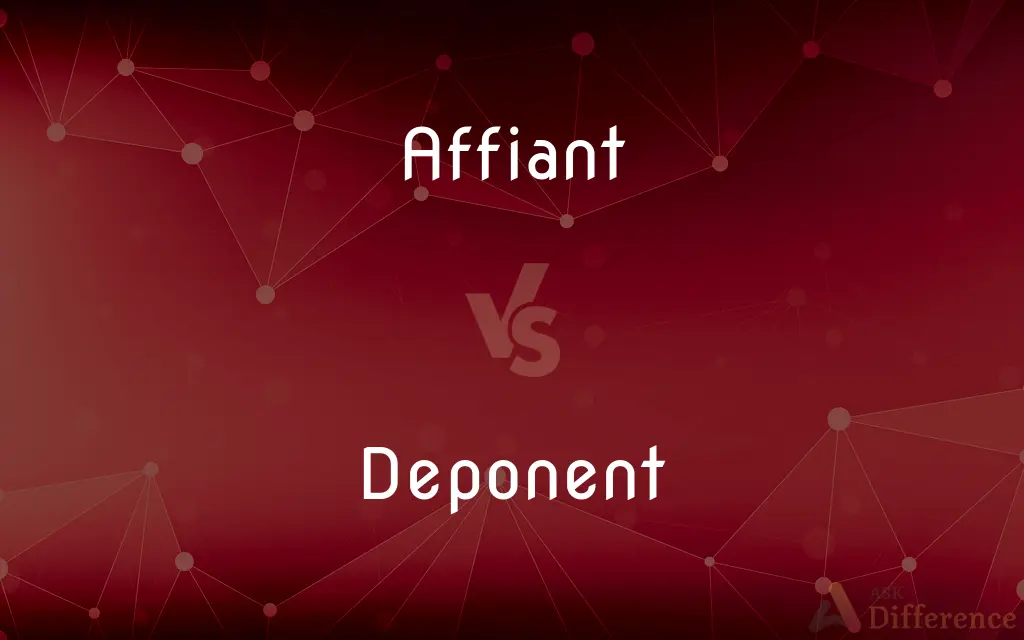Affiant vs. Deponent — What's the Difference?
By Fiza Rafique & Urooj Arif — Updated on March 28, 2024
An affiant is someone who swears to an affidavit's truth, whereas a deponent provides testimony under oath in a deposition.

Difference Between Affiant and Deponent
Table of Contents
ADVERTISEMENT
Key Differences
An affiant is a person who makes a sworn statement in writing, typically in the form of an affidavit. On the other hand, a deponent is an individual who gives testimony under oath outside of court, often during a deposition.
While affidavits and depositions both involve sworn statements, they differ in their form and context. Depositions are part of the discovery process in litigation, where parties to a case gather information from each other.
Affidavits are written and signed documents, used as evidence in court or other legal proceedings. Deponents, in contrast, provide oral testimony that is recorded and transcribed.
Affidavits and depositions serve different purposes in the legal process. Affidavits are often used to submit written evidence or statements of fact to a court or in other legal proceedings. They can establish or support facts without requiring the affiant to be present in court. On the other hand, depositions are a tool for discovery, allowing parties to a lawsuit to gather information and testimony from witnesses and involved parties. This information can be used to build a case or prepare for trial.
Comparison Chart
Definition
Makes a sworn written statement (affidavit).
Gives sworn oral testimony (deposition).
ADVERTISEMENT
Context
Used in court proceedings and legal documents.
Used during discovery in litigation.
Form of Statement
Written and signed.
Oral, later transcribed.
Presence of Officer
Requires an authorized officer for swearing in.
Often requires a legal officer to administer oath.
Purpose
To provide evidence or facts in writing.
To collect detailed information and testimony.
Compare with Definitions
Affiant
A person who swears to the truth of a written statement in an affidavit.
The affiant signed the document in front of a notary, affirming the truth of its contents.
Deponent
Used to gather information and perspectives related to a case.
The deponent's testimony provided valuable insights into the timeline of events.
Affiant
Used primarily in legal proceedings where a written, sworn statement is required.
The lawyer prepared an affidavit for the client to sign as the affiant.
Deponent
Participates in the discovery process of litigation.
As a key witness, the deponent was asked to provide a deposition.
Affiant
Bears legal responsibility for the truthfulness of the affidavit's contents.
As the affiant, he understood that any falsehoods could result in perjury charges.
Deponent
An individual who provides sworn oral testimony during a deposition.
The deponent answered questions from both attorneys during the deposition.
Affiant
Provides written evidence to the court or for legal purposes.
The affiant's statement was submitted to the court as part of the evidence package.
Deponent
Gives testimony under oath, recorded and transcribed.
The deponent was sworn in before the deposition began.
Affiant
Must sign the affidavit in the presence of an authorized officer.
Before signing, the affiant confirmed their identity to the notary public.
Deponent
Testimony can be used in court proceedings or for case strategy.
The lawyers used the deponent's testimony to argue their client's position.
Affiant
One who makes an affidavit.
Deponent
(legal) A witness; especially one who gives information under oath, in a deposition concerning facts known to him or her.
Affiant
(legal) The individual witness whose statement is contained in an affidavit or sworn deposition.
Further affiant sayeth naught. (A centuries-old statement that is still used on some legal documents as the final declaration prior to the affiant's signature.)
Deponent
Being a verb of active meaning but passive or middle form, as certain Latin and Greek verbs.
Affiant
One who makes an affidavit.
Deponent
(Grammar) A deponent verb.
Affiant
A person who makes an affidavit
Deponent
(Law) One who gives testimony by affidavit or deposition.
Deponent
Having passive grammatical form (that is, conjugating like the passive voice), but an active meaning.
Deponent
(grammar) A deponent verb.
Deponent
One who deposes or testifies under oath; one who gives evidence; usually, one who testifies in writing.
Deponent
A deponent verb.
Deponent
Having a passive form with an active meaning, as certain latin and Greek verbs.
Deponent
A person who testifies or gives a deposition
Common Curiosities
What is an affiant?
An affiant is someone who swears to the truth of a statement in an affidavit.
How does an affiant's role differ from a deponent's?
An affiant provides a written statement under oath, whereas a deponent gives oral testimony.
What is a deponent?
A deponent is someone who gives sworn testimony during a deposition.
Can a deponent's testimony be used in court?
Yes, a deponent's testimony can be used in court or for case strategy.
What is the purpose of an affidavit?
To provide written evidence or facts in legal proceedings.
When is a deposition taken?
During the discovery process of litigation to gather information.
Is a deponent's testimony recorded?
Yes, it's orally given then transcribed.
Who can serve as an affiant?
Anyone who can legally make a sworn statement about facts they know.
Can affidavits be used outside of court?
Yes, for various legal and administrative purposes.
What happens if a deponent lies during a deposition?
They can be charged with perjury, similar to lying in court.
How can a deponent prepare for a deposition?
Typically, with the guidance of an attorney to understand the process and potential questions.
Can the content of an affidavit be challenged?
Yes, its accuracy or truthfulness can be contested in court.
What types of questions are asked during a deposition?
Questions can range widely but are aimed at uncovering relevant facts about the case.
Who authorizes an affiant's statement?
An authorized officer, like a notary public.
Is there a limit to how many affidavits an individual can sign as an affiant?
No, as long as each affidavit is truthful and pertains to different matters.
Share Your Discovery

Previous Comparison
Astound vs. Shock
Next Comparison
Pig vs. SwineAuthor Spotlight
Written by
Fiza RafiqueFiza Rafique is a skilled content writer at AskDifference.com, where she meticulously refines and enhances written pieces. Drawing from her vast editorial expertise, Fiza ensures clarity, accuracy, and precision in every article. Passionate about language, she continually seeks to elevate the quality of content for readers worldwide.
Co-written by
Urooj ArifUrooj is a skilled content writer at Ask Difference, known for her exceptional ability to simplify complex topics into engaging and informative content. With a passion for research and a flair for clear, concise writing, she consistently delivers articles that resonate with our diverse audience.














































